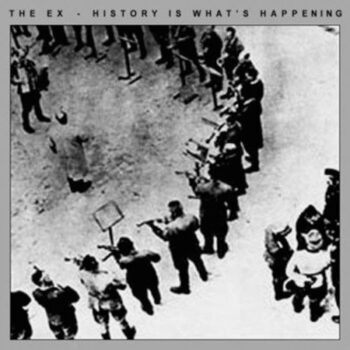
The Ex Disturbing Domestic Peace LP+7″ / History is What’s Happening LP reissues
The greatest anarcho-punk band of our time (or any time), the EX has consistently transcended a genre that’s often reduced to cliches of stencil fonts and high-contrast black-and-white war photos—through four decades and counting, they’ve collaborated with avant-garde cellists and Ethiopian jazz saxophonists, and experimented with free improvisation and ethnic folk music, and never once has any of it seemed disingenuous or forced. Their first two LPs, 1980’s Disturbing Domestic Peace and 1982’s History is What’s Happening, recently got the reissue treatment from Superior Viaduct, and within the EX’s sprawling catalog, they’re arguably the group’s most “conventional” and straightforward statements of intent. On their full-length debut, the EX laid down much of the basic furniture that would remain in place as the band regularly rearranged their musical floor plan in subsequent years—G.W. Sok’s intently ranted vocals and sloganeering lyrics, scratchy knife-edged guitar, tumbling, tightly-knotted rhythms. It’s a lean 22 minutes (not counting the bonus four-song live 7″) of smart agitprop punk fitting the Crass Records-modeled anarcho-ideal, but with an off-center volatility pointing to expanded horizons to come. History is What’s Happening bridges Disturbing Domestic Peace’s raw, square-one approach with much more of a sharp, angular post-punk influence, which would continue to color the band’s sound as they moved toward the ’90s—imagine GANG OF FOUR as Dutch squat-dwellers who would have never broached the idea of signing to a major, a central precept illustrated with scathing bluntness on the jagged, Entertainment!-referencing “E.M. Why” (“The gang of four smiles / They think that EMI’s their friend”). The EX allegedly chose their name because it was quick and easy to spray-paint on a wall, and despite the increasingly complex songwriting on the second LP, it’s still an obvious extension of the group’s original motivations, with each track-as-manifesto blazing through at about a minute or two a piece, just long enough to effectively deliver their points, no time for fucking around. Absolutely essential.
